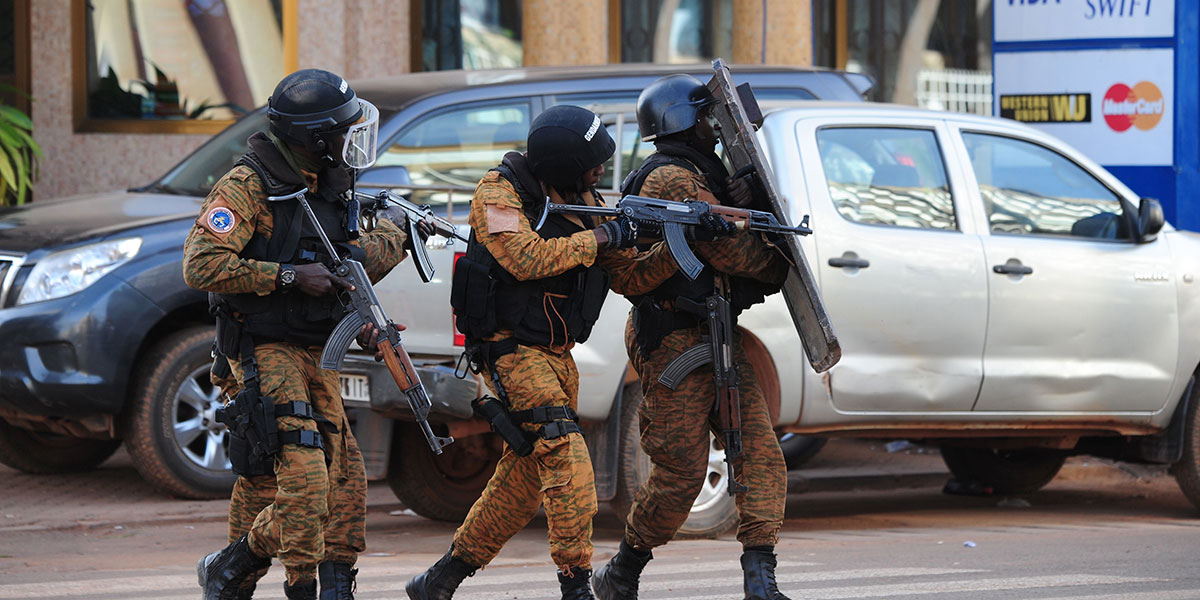Security services in West Africa and the Sahel are confronted with two mutually reinforcing threats: responding to the “old” challenges posed by violent extremism/insurgencies, and responding to their new marching orders to support other state institutions and contributing to managing citizens to adhere to protocols relating to COVID-19.
Responding to COVID-19 and violent extremism will need a renewed sense of undertaking security in a different way – one that is more inclusive and responsive to the needs of broader society – Kwesi Aning, #KAIPTC #C19ConflictMonitor
Tweet
The COVID-19 pandemic and the order to security forces in several African countries to divert part of their routine operational activities to supporting lockdown protocols have been a logistical challenge. In addition, this has created potential openings for extremist groups to cross already porous national and international boundaries for attacks, and hide in already difficult-to-access terrain to stockpile weapons, train and to recuperate from their activities.
In focusing on Ghana, this article examines how the state has responded by using its security forces to support community compliance with COVID-19 protocols, while concurrently keeping its borders safe. It is managing this in spite of being surrounded by contiguous states such as Burkina Faso, which is experiencing an ever-violent and expanding extremist violence; Côte d’Ivoire, which has experienced sporadic violent incidents and is presently in a political unstable state; and Togo, which has also experienced some level of extremist violence.
Similar to other West African states, the order to provide COVID-19-related services brought in its wake unexpected challenges. In Ghana, Operation COVID Safety –the national security task force established to enforce the COVID-19 safety protocols and lockdown – was launched in March 2020 with a combined team of the police, the armed forces and other security agencies. The Ghana Armed Forces, according to Colonel William Nortey, director of army operations, “…are providing military assistance to the civil authority with the police in the lead, [and] we are in the background supporting.” A military mobilisation of over 2 000 army, navy and air force personnel are supporting the police in executing the task. Taking into consideration Ghana’s international engagements in peacekeeping, this is a substantial number of personnel to be diverted from normal operational duties.
How has Ghana managed to ensure that in diverting considerable numbers of its security services to undertake internal joint operations to respond to the COVID-19, extremists have not capitalised on the unintended distractions brought about by this pandemic? This is critical because of how the COVID-19 pandemic is amplifying and exacerbating pre-existing conflict drivers, with grave implications for peace and security in West Africa and the Sahel. According to Mohamed Ibn Chambas, special representative and head of the United Nations (UN) Office for West Africa and the Sahel (UNOWAS): “Terrorists and violent extremist groups are also exploiting the situation to further launch attacks in the region.”
So far, Ghana has been spared any attacks – unlike other West African states, including its neighbours. However, although attacks have been stepped up in Burkina Faso, at this point there is not enough evidence to say that the jihadists are taking advantage of the pandemic in any coordinated way. This lack of exploiting COVID-19 and continuing business as usual can be explained in multiple ways, but I want to focus on two. The first is that extremist groups are using this time to regroup and reorganise, and to restock weapons while they undertake reconnaissance visits and trips to communities to prepare. Second – and particularly related to Ghana – is that although there are ongoing efforts to breach security at the borders, these have constantly been repelled. Assessments at several border crossings along the Ghana–Burkina Faso international boundary show that several joint international and domestic operations have either foiled attempted border breaches or sent a robust signal of the preparedness of the security forces. For example, Operation Conquered Fist sought to deal with terrorist activities in the northern sector of Ghana. To this end, the exercise regularised standard operating procedures (SOPs) and contingency plans to heighten preparedness for any contingencies. Operation Eagle Claw,which has just concluded in the Upper West Region along the Ghana–Togo and Ghana–Burkina Faso borders, was an anti-terrorism operation aimed at improving training and testing the skills of troops in air mobile operations. This operation was undertaken in cooperation with the Ghana Air Force, in collaboration with the Ghana Police Service, the Ghana Immigration Service, the Customs Division of the Ghana Revenue Authority and the Bureau of National Investigations.
Apart from these internal operations, there are collaborative regional military operations that Ghana, in partnership with its contiguous states, has initiated. Specifically, a joint security operation, codenamed Koudanlgou III – which sought to “…prevent terrorist activities, illegal resource extraction, drug trafficking, dealing in illicit arms, smuggling, among other transnational crimes” – has already led to the arrest of over a hundred suspected terrorists.
COVID-19 will continue to pose security-related challenges, as agencies themselves experience the ravages on personnel posed by this virus and the expected concurrent activities of extremists. Responding to these two symbiotic encounters will need leadership, collaborative engagements with communities and, above all, a renewed sense of undertaking security in a different way – one that is more inclusive and responsive to the needs of broader society.
Kwesi Aning is full professor and director of Faculty of Academic Affairs and Research (FAAR), Kofi Annan International Peacekeeping Training Centre. He served as the African Union’s first expert on counterterrorism from 2005 to 2007. In 2006 and 2014, he wrote the independent, mid-term, in-depth evaluation of the Global Programme on Strengthening the Legal Regime against Terrorism and, in 2008, wrote a UN Secretary General’s report on the African Union relating to peace and security for the UN Security Council. Until January 2019, he served on the UN Secretary General’s Advisory Group for the Peacebuilding Fund. He specialises in peacekeeping economies, hybrid security/political orders and organised crime.

